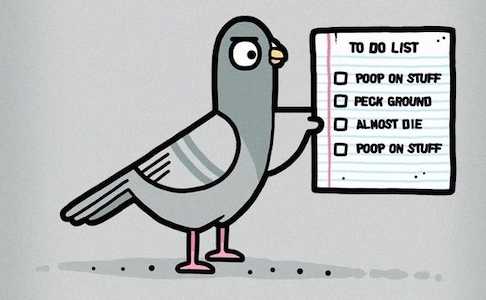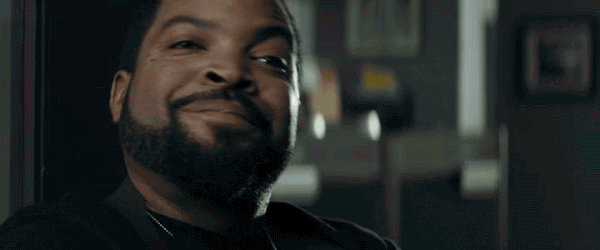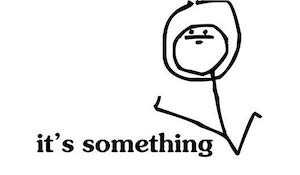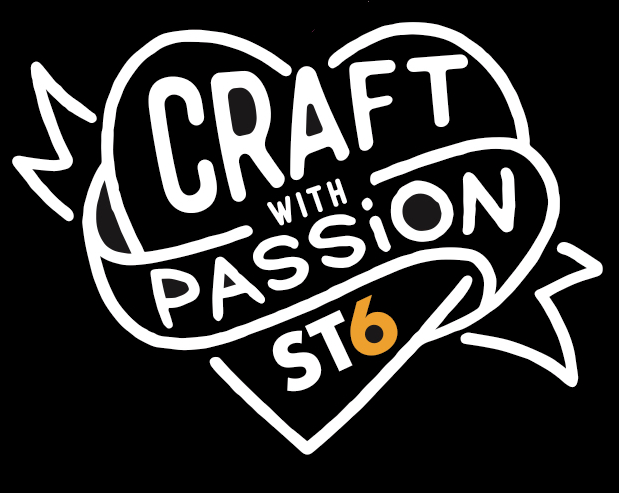We live in an era of extreme busyness. It's too easy to get swallowed up by day-to-day tasks and skip taking a minute to just look back and reflect on our day and ourselves. We're too busy to spend a minute on this because it eats away from our precious time and we can't afford it. Inevitably the moment comes, when we lose focus, lose motivation, but it's ok as "these things happen", and we are "fine".
We know being "fine" is not where we want to be. We want something more.
We are going to take a look at the most common states of mind we are in during our typical workday. We'll see how it affects us and what we can do about it in a few simple steps. We are not going to change the way we operate that much, but rather tweak the perception and expectations we have for ourselves.
Doing everything with ease (our A-game)
 Original image from ideasforfreedom.
Original image from ideasforfreedom.
There are days where we can’t wait to get something done and see its fruits. We have laser focus. We are proud of ourselves because we know we gave our best, no matter the outcome. We believe this is what matters and what will get us where we want to be.
This is when we have momentum. We feel we just know the right things to do. This is when we are in the zone. Everything is great. This is our A-game.
This is part of Jared Tendler's concept about the improvement process, called "Inchworm".
You can read more about it in his book The Mental Game of Poker on page 28
We can easily find ourselves in this state when we are really excited about getting something done and we have a burning desire for it. Maybe we find it very meaningful to us. It might be a cause, a belief, or whatever it is that resonates with our true self. We can also get there by other circumstances as well – i.e. our love life is going great, we are in a good relationship with the people that matter the most, or it's that good things just happen randomly here and there.
Back to reality (B and C-game)
 Original image from CEO Magazine.
Original image from CEO Magazine.
On the other hand, life isn’t all sunshine and rainbows. We are not that often in our A-game state of mind. Most of the time we are at our B, C and even D-game. Often enough, we are not that motivated, we lack focus, we beat ourselves to the ground to get something done. Before we realize it, the day is over and we feel like we haven’t achieved anything meaningful. Sounds familiar, right?
Did we really not achieve anything this day? I doubt it.
Why is it then that we feel this way?
It turns out we had expectations (spoken or not) about the day, about us, that we didn’t meet. Failing to meet these expectations makes us feel bad in many ways.
What can we do for our non-A-game days?
It looks like our life is a chain of ups and downs. Now you might be saying "whoa, thank you, Captain Obvious, for this insight!".
Sure, I'm stating the obvious, but the point here is we can't turn the tide. Whether we like it or not, life will put us in a variety of situations – good and bad.
What's important is how we approach each one of them.
We want to feel good about ourselves, even when we're not at our best. We need to accept what we can't change and make the best out the hand we're dealt with at the moment.
Set the right expectations for the day
 Original image from James Brook blog.
Original image from James Brook blog.
1. Start each day by objectively evaluating what you can achieve for the day
If you have a TODO list, there’s a decent chance it’s overflowing. Tasks keep piling and piling until eventually, you can clearly see how off-the-track you are. Maybe you want to do too much in a single day. If you often find yourself in this situation, well… maybe your “objective” evaluation is not that objective and needs to be adjusted.
2. Formulate your tasks in a way that you can cross them off by the end of the day
 Original image from memeguy.
Original image from memeguy.
If you take on a big task that would take days to finish, well… promise to yourself that you’ll do only 20% of the work. Come up with some checkpoint for these 20%. Do this in advance and be proud of yourself later for sticking to the initial plan.
3. Limit yourself to the very few things that matter the most
Ask yourself “if I could do only one thing today, what would it be?“.
Start from there. At the end of the day, we want to take a look back and say...

4. Remind yourself of your long-term goal
Spare a minute or two to take a look where you are now and where you want to be. Find the connections between today’s tasks and your long-term goal. See how what you do today affects your whole journey even if it is in the slightest manner.
Approach unpleasant tasks with the right attitude
Starting a task with a bad attitude is a recipe for failure.
Whatever your profession is, there are always things you don’t enjoy much but have to do either way. Whether you like it or not, these moments play a vital role in shaping you as the professional you want to be. The true acceptance of this idea will make it a lot easier to cope with these moments. We can’t change it, but we can change our attitude towards it. We learn every day, so a better way to approach these moments is to try find something interesting, something that this particular task can teach you. Sometimes it might feel the only thing you get out of it is boosting your willpower, but hey...
Celebrate the small wins
I can’t emphasize this enough. Every time you cross a task off, you hit a checkpoint, or you just get that feeling you’re doing well, stop right there and take a moment to smile and appreciate your effort. You deserve it.
Let's put it all into practice
Being part of ST6 – a flat-structured company, where empowerment and ownership are embedded in its culture, it looks like the perfect place to verify the validity of the ideas above. "With great power comes great responsibility," Peter Parker says. Let's give some perspective to this.
Here, at ST6, I have no boss, I have no manager. I have a tribe by my side, and they're here to help. Despite the fact we all share common values, we're still very diverse. What works for somebody, might not work for someone else. So, who would know how I can do my best better than me? Right, but with this comes the ownership and responsibility part. A good thing among ST6-ers is that we also look at failure as an opportunity to grow, so even if I try something that doesn't really work out... well, I'll know better.
So, how does all this fit in my typical work-day?
First things first – it's not the TODO list, but having a proper start of the day – chit-chat with the colleagues over a cup of coffee.
Next, I go to my desk and about 9:30 my recurring daily TODO is prompting me. It's called "Divide & Conquer the day with subtasks". It takes me up to 3 minutes to revise and decide what my daily focus will be. Then, I estimate how much of it I can do today and write down only these. Boom, here it is- the first task for the day is finished. I cross it off, yeyy! Feels good.
Once I'm done with a task (excluding the 1st one), I take a short 5-10 minutes break. These moments are perfect to clear your mind, praise yourself and freshen up for what's next.
In the past, I used to "get the advantage of the momentum" and go straight to the next thing. Don't fall for this! A lot of time passed, until it hit me- I'm not actually using the momentum, but rather using all my fuel for the day with full throttle. In F1 you can make the fastest few laps this way, but you won't make it to the finish line for sure. It looks obvious now, but this is how learning works.
Of course, there are times when things don't go according to plan. Maybe you underestimated how hard a task would be, or today is not your best day. Oscar Godson has said it very well- "One of the best programming skills you can have is knowing when to walk away for a while." Take a break and don't be hard on yourself- this is part of the game.
How about your cheat-sheet?
By no means is this the key to the secrets of life, of course.
We are all human, we are all different. This is what helps me stay on the right track. For you, it might be flavored differently.
Share your cheat-sheet in the comments below. I'll be happy to dive into what works for you.





